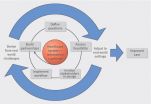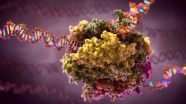(Press-News.org) SEATTLE--Pragmatic clinical trials--real-life tests done in real-world settings--are increasingly important for answering pressing questions about how best to deliver health care. But these pragmatic trials require close collaboration between two professional groups who often have contrasting styles. One group is researchers, who follow structure like classical musicians. The other is and health care providers and administrators, who may need to improvise like jazz musicians. How in the world can such disparate players make beautiful music together?
"The key is not just to waltz in--but instead to get in tune with each other, make compromises, and 'rehearse' with pilot periods," said Karin E. Johnson, PhD, a research associate at Group Health Research Institute. She is the first author of "A guide to research partnerships in pragmatic clinical trials" in The BMJ, which stresses these steps: Build partnerships, define clinically important questions, assess feasibility, involve stakeholders in study design, and develop study workflows.
The guide is a product of interviews with pragmatic clinical trial experts, including people involved in demonstration pragmatic clinical trials supported by the Health Care Systems Research Collaboratory of the U.S. National Institutes of Health (NIH) and the REDUCE MRSA trial. The guide highlights the following lessons about building strong research partnerships between health researchers and health care systems:
Participating in pragmatic clinical trials can provide health care systems with evidence and tools to improve health care--and researchers with chances to do high-impact studies.
Pragmatic clinical trials answer questions that matter to health care systems. So clinicians, health care managers, health information technology, and clinical operations staff--and, increasingly, patients--should be involved in designing studies.
Successful pragmatic clinical trials start with a strong researcher-health care system partnership. They go through rigorous, objective evaluation of the partner health care system(s)'s ability to participate. And they produce long-term scientific relationships--and evidence about sustainable ways to improve care.
Pragmatic clinical trials are comparative effectiveness studies conducted in real-world settings to answer questions that matter to patients, clinicians, and health care decision makers, Dr. Johnson explained. They include some randomized trials. By contrast, explanatory clinical trials study how treatments or interventions work in carefully controlled settings and study populations, often to investigate a biological hypothesis or test a drug or device to meet regulatory requirements.
"This guide is a product of the Collaboratory's Health Care Systems Interactions Workgroup," said Dr. Johnson's coauthor Eric. B. Larson, MD, MPH, the executive director and a senior investigator at Group Health Research Institute and Group Health's vice president for research. "We're excited about sharing the valuable lessons that we've learned about how best to create and sustain research partnerships for pragmatic clinical trials in a widely read and prestigious journal like The BMJ."
Members of the NIH's Health Care Systems Research Collaboratory overlap with those of the HMO Research Network, which includes 18 research centers, each associated with a health care delivery system. When this guide was presented at the 2014 annual conference of the HMO Research Network, it was chosen as its first annual "paper of the year."
INFORMATION:
A cooperative agreement (U54 AT007748) from the NIH Common Fund for the NIH Health Care Systems Research Collaboratory supported this work.
Drs. Johnson and Larson's coauthors are Gregory E. Simon, MD, MPH, a Group Health psychiatrist and senior investigator at Group Health Research Institute; Chris Tachibana, PhD, scientific editor and writer, Julie Richards, MPH, and Ella Thompson, project managers, all at Group Health Research Institute; Gloria Coronado, PhD, a senior investigator at Kaiser Permanente Center for Health Research, in Portland, OR; Laura Dember, MD, a professor of medicine at the University of Pennsylvania Perelman School of Medicine in Philadelphia; Russell Glasgow, PhD, associate director of the Colorado Health Outcomes Program at the University of Colorado School of Medicine in Aurora; Susan Huang, MD, MPH, an associate professor and medical director of epidemiology and infection prevention at the University of California Irvine School of Medicine; Paul J. Martin, MD, medical director of Clinical Research Support at the Fred Hutchinson Cancer Research Center in Seattle; Gary Rosenthal, MD, a professor of internal medicine at the University of Iowa in Iowa City; Ed Septimus, MD, medical director, Infection Prevention and Epidemiology, Clinical Service Group, Hospital Corporation of America in Nashville; Leif Solberg, MD, associate medical director for care improvement research at HealthPartners Institute for Education and Research in Bloomington, MN; and Jerry Suls, PhD, a senior scientist at the National Cancer Institute in Bethesda, MD.
NIH's Health Care Systems Research Collaboratory
Supported by the Common Fund at the National Institutes of Health (NIH), the Health Care Systems Research Collaboratory is intended to improve the way clinical trials are conducted by creating a new infrastructure for collaborative research. The ultimate goal is to ensure that healthcare providers and patients can make decisions based on the best available clinical evidence. The NIH HCS Research Collaboratory also supports the design and rapid execution of several high-impact Pragmatic Clinical Trial Demonstration Projects that will address questions of major public health importance that engage health care delivery systems in research partnership.
Group Health Research Institute
Group Health Research Institute does practical research that helps people like you and your family stay healthy. The Institute is the research arm of Seattle-based Group Health Cooperative, a consumer-governed, nonprofit health care system. Founded in 1947, Group Health Cooperative coordinates health care and coverage. Group Health Research Institute changed its name from Group Health Center for Health Studies in 2009. The Institute has conducted nonproprietary public-interest research on preventing, diagnosing, and treating major health problems since 1983. Government and private research grants provide its main funding. Follow Group Health research on Facebook, Twitter, or YouTube.
MAYWOOD, Il. - Medical schools have an ethical obligation to change admission policies in order to accept applications from undocumented immigrants known as Dreamers, according to an article in the December, 2014 issue of the journal Academic Medicine.
Not allowing Dreamers to apply to medical school "represents a kind of unjustified discrimination and violates the basic ethical principle of the equality of human beings," write co-authors Mark G. Kuczewski, PhD and Linda Brubaker, MD, MS of Loyola University Chicago Stritch of Medicine. Academic Medicine is the journal ...
Taking inspiration from nature, researchers have created a versatile model to predict how stalagmite-like structures form in nuclear processing plants - as well as how lime scale builds up in kettles.
"It's a wonderful example of how complex mathematical models can have everyday applications," said Dr Duncan Borman, from the School of Civil Engineering at the University of Leeds, a co-author of the study.
The main aim of the research, which is published in print today in the journal Computers & Chemical Engineering, is to reduce the number of potentially harmful manual ...
Scientists at Nanyang Technological University (NTU Singapore) and Penn State University in the United States have successfully discovered one of modern human's ancient lineages through the sequencing of genes.
World-renowned geneticist from NTU, Professor Stephan Christoph Schuster, who led an international research team from Singapore, United States and Brazil, said this is the first time that the history of mankind populations has been analysed and matched to Earth's climatic conditions over the last 200,000 years.
Their breakthrough findings are published today ...
Wetlands are among the most productive ecosystems on Earth. Yet with increasing urbanization and agricultural expansion, wetlands around the globe are in danger. Better mapping of wetlands worldwide will help in their protection.
But compiling globe-spanning maps of wetlands is impeded by the dramatic diversity and evolving dynamics of wetlands, and by myriad difficulties in doing field work.
To develop a better model, Gong Peng and other scientists at the State Key Laboratory of Remote Sensing Science, Chinese Academy of Sciences, in Beijing incorporated hydrologic, ...
A natural substance present in red wine, resveratrol, inhibits the formation of inflammatory factors that trigger cardiovascular diseases. This has been established by a research team at the Department of Pharmacology of the University Medical Center of Johannes Gutenberg University of Mainz (JGU) working in collaboration with researchers of the Friedrich Schiller University in Jena and the University of Vienna. Their results have recently been published in the scientific journal Nucleic Acids Research.
Despite the fact that they eat more fatty foods, the French tend ...
When you go to bed, and how long you sleep at a time, might actually make it difficult for you to stop worrying. So say Jacob Nota and Meredith Coles of Binghamton University in the US, who found that people who sleep for shorter periods of time and go to bed very late at night are often overwhelmed with more negative thoughts than those who keep more regular sleeping hours. The findings appear in Springer's journal Cognitive Therapy and Research.
People are said to have repetitive negative thinking when they have bothersome pessimistic thoughts that seem to repeat in ...
This news release is available in German.
In quantum optics, generating entangled and spatially separated photon pairs (e.g. for quantum cryptography) is already a reality. So far, it has, however, not been possible to demonstrate an analogous generation and spatial separation of entangled electron pairs in solids. Physicists from Leibniz University Hannover and from the Physikalisch-Technische Bundesanstalt (PTB) have now taken a decisive step in this direction. They have demonstrated for the first time the on-demand emission of electron pairs from a semiconductor ...
Some patients with non-small cell lung cancer (NSCLC) have changes in the anaplastic lymphoma kinase (ALK) gene, which can drive the development of their cancer. A drug recently developed by Pfizer, crizotinib, targets ALK and is currently given to patients with ALK positive lung cancer when their cancer has worsened after initial chemotherapy. Now doctors have investigated the use of crizotinib in patients with ALK positive lung cancer who have not yet received any chemotherapy treatment.
Dr Fiona Blackhall, a senior lecturer in The University of Manchester's Institute ...
New York | Heidelberg, 4 December 2014 Studying the motion of electrons in a disordered environment is no simple task. Often, understanding such effects requires a quantum simulator designed to expose them in a different physical setup. This was precisely the approach adopted by Denis Makarov and Leonid Kon'kov from the Victor I. Il'ichev Pacific Oceanological Institute in Vladivostok in a new study published in EPJ B. They relied on a simulator of electronic motion subjected to noise stemming from a flux of sound waves.
Their findings could lead to semi-conductor devices ...
A new, innovative "dashboard" from the National Institute of Standards and Technology (NIST) won't help you drive your car, but it will help enable reproducible research in biology.
In a recent paper in the journal Nature Communications,* an international multi-laboratory team demonstrates a new software tool, the "erccdashboard," to evaluate the performance of experimental methods used to study gene expression. The analysis tool is designed for use with RNA spike-in controls developed by the NIST-hosted External RNA Controls Consortium (ERCC**). These ERCC controls are ...




